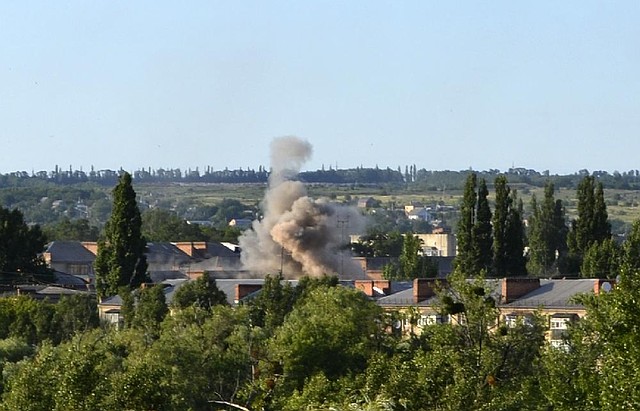NATO: Russian forces at border
New buildup seen as attempt to counter Ukraine offensive
Smoke rises from an explosion near a children's hospital following shelling from Ukrainian government forces in Slovyansk, Ukraine, Thursday, June 19, 2014. Heavy fighting raged near Krasnyi Liman, just east of the rebel stronghold of Slovyansk, a city in the Donetsk region that has been the epicenter of violence during the past two months. (AP Photo/Andrei Petrov)
Friday, June 20, 2014
MOSCOW -- Russia is resuming its military buildup along the Ukrainian border in an apparent attempt to intimidate its neighbor, NATO's chief said Thursday as Ukrainian government forces began a new offensive against pro-Moscow insurgents.
Russian President Vladimir Putin spoke by telephone to German Chancellor Angela Merkel and French President Francois Hollande, voicing strong concern about the Ukrainian military onslaught. Putin said he expects Ukrainian President Petro Poroshenko to immediately launch his plan to end the violence, the Kremlin said.
Putin and Poroshenko then discussed details of the peace plan in a phone call -- their second conversation this week. Poroshenko's office said he emphasized the need for introducing effective border controls and quickly releasing hostages.
Russia has denied Ukrainian and Western allegations that it is fomenting the rebellion by sending troops and weapons into Ukraine.
Last month, Putin ordered his military to withdraw from the border, and NATO confirmed that the bulk of an estimated 40,000 Russian troops had pulled back. But on Thursday, NATO Secretary-General Anders Fogh Rasmussen said Russia has deployed a few thousand additional troops to the border, calling it "a very regrettable step backward."
"If they're deployed to seal the border and stop the flow of weapons and fighters, that would be a positive step. But that's not what we're seeing," Rasmussen said in London.
The Russian Defense Ministry refused to comment.
Heavy fighting raged Thursday near Krasnyi Liman, just east of the rebel stronghold of Slovyansk, a city in the Donetsk region that has been the epicenter of violence during the past two months.
Vladislav Seleznev, a spokesman for Ukrainian forces in the east, described the area as a strategic supply corridor for the rebels. He said in a statement on Facebook that four government troops were killed and 20 wounded in the fighting Thursday.
He said up to 200 rebels were killed and hundreds wounded. The claim could not be independently confirmed.
Rebel chief Igor Strelkov said in a statement on YouTube that his men were far outnumbered and outgunned and would probably be forced to retreat.
Strelkov, clad in combat fatigues, bitterly scolded the Kremlin for failing to help the rebellion and issued a desperate plea to send in troops.
"I hope that they have enough conscience left in Moscow to take some measures," he said.
There was no immediate response from the Kremlin, which has ignored previous pleas for help from the insurgents.
Putin has faced strong pressure from nationalists at home to send troops into Ukraine since the annexation of Crimea in March. But Putin, eager to avoid new Western sanctions, has instead welcomed a peace plan put forward by Poroshenko.
Poroshenko on Wednesday promised to call a unilateral cease-fire to give the rebels a chance to lay down their weapons and leave the country.
Next week, the foreign ministers and leaders of the European Union are to meet and are expected to consider tougher economic sanctions against Russia over the Ukraine crisis.
"The international community would have to respond firmly if Russia were to intervene further," Rasmussen said. "That would imply deeper sanctions, which would have a negative impact on Russia."
A Section on 06/20/2014

